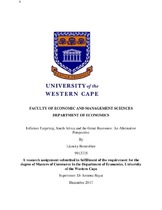| dc.contributor.advisor | Bayat, Amiena | |
| dc.contributor.author | Bestenbier, Liansky | |
| dc.date.accessioned | 2018-08-23T08:50:42Z | |
| dc.date.available | 2018-08-31T22:10:07Z | |
| dc.date.issued | 2017 | |
| dc.identifier.uri | http://hdl.handle.net/11394/6345 | |
| dc.description | Magister Commercii - MCom (Economics) | |
| dc.description.abstract | Described by Mohr (2008:1) as "one of the most hotly debated economic issues in South Africa",
the inflation rate is underpinned by its impact on the average South African. A rapid increase in
the cost of goods and services could have devastating consequences on the both the growth and
development of the country, making it an imperative to effectively manage a change in general
prices. The SARB applies an Inflation Targeting (IT) framework to manage the inflation rate and
the thesis will interrogate the applicability of this framework within a low growth environment.
More specifically, the thesis will ask whether it is prudent to increase the interest rate in a low
growth environment.
The thesis will employ a mixed research method, namely, a qualitative and quantitative method.
However, the qualitative method will be the primary research method and the conclusions
derived thereof will be tested within a qualitative model. The qualitative method will take the
form of historical narrative which is designed to investigate the behaviour of the inflation rate at
a micro level. The choice of this qualitative historical narrative derives from the inconclusive
nature of the existing empirical quantitative studies and the resulting lack of a consensus on the
effectiveness of the IT framework. This lack of consensus necessitated the use of a different
approach to interrogate the IT framework hence the application of the qualitative historical
narrative. The narrative will be primarily derived from the economic reports and data of the main
authority on South Africa's monetary policy, the South Africa Reserve Bank (SARB). The
narrative will also utilise the economic reports and data from reputable sources such as Statistics
South Africa, the International Monetary Fund (IMF), the World Bank, the European Central
Bank (ECB), the US Federal Reserve System, and the People's Bank of China (PBC). | |
| dc.language.iso | en | |
| dc.publisher | University of the Western Cape | |
| dc.subject | Inflation Targeting, South Africans, inflation rate, pre-crisis period, historical analysis | |
| dc.title | Inflation targeting, South Africa and the Great Recession: An alternative perspective | |
| dc.rights.holder | University of the Western Cape | |

